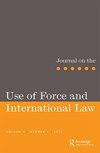你不能在这里上网,这里是作战室!拒绝网络战争的影响原则和在国际法中使用武力
Q3 Social Sciences
Journal on the Use of Force and International Law
Pub Date : 2017-06-13
DOI:10.1080/20531702.2017.1338388
引用次数: 1
摘要
摘要关于战争法对网络攻击的适用性,文献中越来越多的共识是,攻击造成的影响应决定攻击是否构成使用武力(《联合国宪章》第二条第四款)或引发自卫的武装攻击(《联合国宪章》第五十一条)。这篇文章认为,这种方法是不一致的和危险的。推动将网络攻击纳入现有的武力使用框架,无视了对经济制裁和间谍活动造成的损害等其他非常规武力使用的共识,而且是以耸人听闻的媒体报道中危险的夸张为前提的。这种做法忽视了有关网络攻击归属的严重实际问题,并将为滥用打开大门。没有理由削弱基于反乌托邦场景的故意狭隘的武力使用系统的有效性。本文章由计算机程序翻译,如有差异,请以英文原文为准。
You can’t cyber in here, this is the War Room! A rejection of the effects doctrine on cyberwar and the use of force in international law
ABSTRACT There is a growing consensus in the literature on the applicability of the jus ad bellum to cyber-attacks that the effects caused by an attack should determine whether the attack constitutes a use of force (Article 2(4) of the UN Charter) or an armed attack giving rise to self-defence (Article 51 of the UN Charter). This article argues that this approach is inconsistent and dangerous. The push to include cyber-attacks in the existing framework on the use of force disregards the consensus on other non-conventional uses of force like economic sanctions and damage caused by espionage, and it is premised on dangerous hyperbole in sensational media stories. Such an approach ignores serious practical problems regarding the attribution of cyber-attacks and would open the door wide for abuse. There is no reason to weaken the effectiveness of a deliberately narrow system on the use of force based on dystopian scenarios.
求助全文
通过发布文献求助,成功后即可免费获取论文全文。
去求助
来源期刊

Journal on the Use of Force and International Law
Social Sciences-Law
CiteScore
1.10
自引率
0.00%
发文量
13
 求助内容:
求助内容: 应助结果提醒方式:
应助结果提醒方式:


